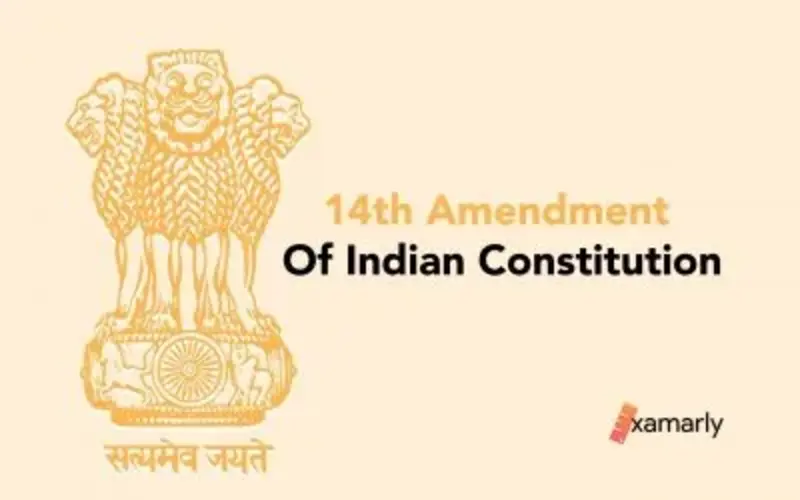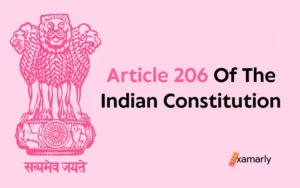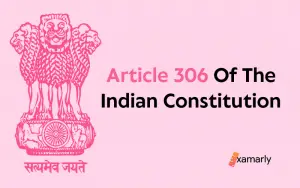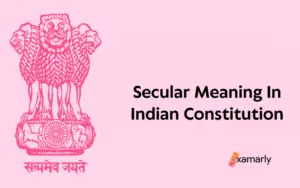Pondicherry (now Puducherry) became the ninth Union territory of India by the 14th Amendment of Indian Constitution. Additionally, it provided Parliament with the power to enact laws establishing legislatures and ministerial councils in specific Union regions.
The French colonies of Pondicherry, Mahé, Yanam, and Karikal officially became part of the Indian Union on August 16, 1962.
The above event was following the ratification of the Treaty of Cession by France and India.
This article is about the 14th Amendment of Indian Constitution which will be fruitful in your UPSC Examination.
- 14th Amendment of Indian Constitution
- Statement of Objects and Reasons
- Important Provisions of the Amendment
- Conclusion
- Frequently Asked Questions
- When did Pondicherry become a Union Territory?
- How did the 14th Amendment to Indian Constitution impact Pondicherry?
- What was Pondicherry's status prior to becoming a Union Territory?
- What are the other Union Territories in India?
- What is the role of the Lieutenant Governor in the administration of Union Territories in India?
- What is the legislative assembly of Pondicherry?
- What are some of the key features of Pondicherry as a Union Territory?
14th Amendment of Indian Constitution
The Fourteenth Amendment of the Indian Constitution is known as The Constitution (Fourteenth Amendment )Act, 1962. The amendment included Pondicherry, India’s ninth Union territory.
Additionally, this amendment provided Parliament the power to enact laws for creating legislatures and a council of ministers for certain union territories. These certain Union Territories are Puducherry, Goa, Himachal Pradesh, Tripura, Daman and Diu, and Manipur.
On August 30, 1962, the Constitution (Fourteenth Amendment) Bill, 1962, was presented in the Lok Sabha. Lal Bahadur Shastri, the minister of home affairs at the time, proposed this amendment.
It wanted to change sections 81 and 240 and the First and Fourth Schedules to the Constitution. Additionally, a new article 239A was proposed to be added to the Constitution.
Statement of Objects and Reasons
The “Treaty of Cession” was ratified by the governments of India and France on August 16, 1962, making the French establishments.
Karaikal, Mahe, Yanam, and Pondicherry territories are the French establishments of the Indian Union. According to this Act, these areas will be listed in the constitution as “Pondicherry,” a union territory.
Twenty members are the maximum number that may represent the Union territory in the House of People, according to Article 81(1)(b) of the Indian Constitution.
This ceiling has been hit. The bill aims to raise this number to 25 to provide Pondicherry representation in the House of the People right away and to account for future contingencies.
Through a new article 239A, the Act also grants the parliament the necessary legislative authority to enact laws that will establish legislatures and councils of ministers in many Union territories, generally following the same framework as some of the part “C” states that existed before the recognition of the states.
The purpose of introducing the new article 239A is to grant Parliament the essential authority to pass laws for the effective governance of the reorganized states. This article closely mirrors the provisions of article 240 that existed prior to the states’ reorganization.
Important Provisions of the Amendment
Several important provisions are contained in the 14th Amendment of Indian Constitution.
- Amendment of Article 81- In article 81’s subclause (b) of clause (1) of the Indian Constitution, the greatest number of Lok Sabha seats available for Union territory representatives must be raised from twenty to twenty-five members.
- The Indian Constitution’s first schedule is modified to add the territories of “Pondicherry” as the ninth Indian Union Territory as of August 16, 1962.
- Article 239A- After article 239, article 239A is added.
- The French colonies of Pondicherry, Mahé, Yanam, and Karikal became part of the Indian Union on August 16, 1962.
- This followed the ratification of the Treaty of Cession by both France and India. The integration of the colonies into the Indian Union was formalized through the Treaty of Cession.
- Section 4 of the Amendment provided that any law passed for this purpose would not be deemed to be an amendment of the Constitution for article 368.
- To provide the President with the authority to “establish regulations for the peace, progress, and good governance” of the territory, clause (1) of article 240 of the Constitution was amended to include the Union territory of Pondicherry.
- The President, however, shall no longer promulgate regulations or take other actions with effect from the date set for the first meeting of any legislature established under the new article 239A to serve the union territories of Goa, Daman, and Diu, or Pondicherry.
- The Union Territory of Pondicherry was given a seat in the Rajya Sabha through an amendment to the Fourth Schedule of the Constitution.
Conclusion
14th amendment of Indian Constitution added Pondicherry, a former French colony, to the First Schedule as a Union territory. On December 28, 1962, the 14th amendment bill was approved by then president Sarvepalli Radhakrishnan and went into effect the following day.
The 14th Amendment of Indian Constitution represents a significant milestone in the country’s history.
Its provisions expanded the scope of the Constitution to include essential principles such as social justice and economic welfare, furthering the goal of creating a more equitable society.
The Amendment also brought about changes in the representation of states in Parliament, paving the way for more effective governance.
In this blog, we have curated important information about the 14th amendment of Indian constitution. Grab a notebook, take notes and increase the pace of your UPSC exam preparation.
Frequently Asked Questions
When did Pondicherry become a Union Territory?
Pondicherry became a Union Territory on 1 November 1954, following the implementation of the 14th Amendment to the Indian Constitution.
How did the 14th Amendment to Indian Constitution impact Pondicherry?
The 14th Amendment to the Indian Constitution played a crucial role in the formation of the Union Territory of Pondicherry. It provided for the establishment of new Union territories and made changes to the representation of states in Parliament.
What was Pondicherry’s status prior to becoming a Union Territory?
Prior to becoming a Union Territory, Pondicherry was a French colony. It was officially ceded to the Indian Union in 1954, following negotiations between the French and Indian governments.
What are the other Union Territories in India?
In addition to Pondicherry, there are currently eight other Union Territories in India: Andaman and Nicobar Islands, Chandigarh, Dadra and Nagar Haveli and Daman and Diu, Lakshadweep, Delhi, Jammu and Kashmir, Ladakh, and Andhra Pradesh.
What is the role of the Lieutenant Governor in the administration of Union Territories in India?
The Lieutenant Governor is the head of the administration of Union Territories in India. They are appointed by the President of India and have executive, legislative, and judicial powers in the Union Territory.
What is the legislative assembly of Pondicherry?
The legislative assembly of Pondicherry is a unicameral legislature with 33 members. It is headed by a speaker and is responsible for passing laws and making policies for the Union Territory.
What are some of the key features of Pondicherry as a Union Territory?
Pondicherry has its own legislative assembly and government, but it is also under the direct control of the central government of India. It has a unique culture and history, influenced by its French colonial past, and is known for its beaches, temples, and other cultural landmarks.






